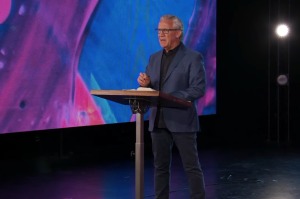Why Christians 'Admonish the Sinner,' And What That Really Means

It was recently reported that Christopher Hitchens, the famous atheist apologist and author, "was contemplating conversion" around the time of his death in 2011. If one is familiar with the vehemence that Hitchens often derided Christianity, this is quite a surprise. It is also a wonderful illustration of the exquisitely paradoxical mystery of God's grace.
I am reminded of something that happened this past August, when I had the opportunity to engage in a lively debate with a twenty-something guy whom I encountered by chance (or was it Providence?) at an "atheist booth" at Balboa Park in San Diego. There were a number of different booths set up in the park that day, some selling jewelry, others food items. When I first saw the "Ask an Atheist" booth, I was a bit startled. It seemed strange to have a booth dedicated to a negation, a lack of something positive like belief.
But I knew I had to talk to the atheists. An "atheist booth" is something that is begging for attention, it seems to me. To advertise being an atheist in such a public way practically screams, "Please prove me wrong!" Plus, I love a good debate.
For me, there's almost nothing more exhilarating than the passionate exchange of differing ideas in a face-to-face discussion. It's an exciting way to directly test your arguments against someone who sees things differently, and it almost inevitably strengthens your own faith in the process by forcing you to consider your own arguments in a fresh way. This is especially true when your counterpart is someone you've never met before who is almost certain to present their arguments in what is, to you, an equally new way.
The booth guy and I did indeed end up have a spirited debate — after a half an hour or so, it was clear that neither one of us was giving up any ground. He offered me his email address so we could continue the debate online, which I gladly accepted.
For the next four months, we exchanged a number of emails and engaged in a substantive back and forth. Unfortunately, the booth guy stopped replying a few months ago, and since then I am often tempted to wonder: was the whole thing a waste of time? It seemed as though I made virtually no headway in convincing him of the existence of God.
It's tempting to think this way, but I have since come to realize that producing a successful end result is not what my Catholic Christian faith tells me to do when witnessing to my fellow man. My faith simply says that we must love, because Christ loves us.
That's easy to say, but how do we do it? In Catholicism, we are given a set of concrete ways that we can love through works of mercy, both corporal (physical) and spiritual.
Since we have been speaking of spiritual matters, let's consider the seven "spiritual works of mercy." They are:
1. To instruct the ignorant.
2. To counsel the doubtful.
3. To admonish sinners.
4. To bear wrongs patiently.
5. To forgive offences willingly.
6. To comfort the afflicted.
7. To pray for the living and the dead.
Pretty straightforward, right?
One would think that most citizens of our politically correct society and even most atheists would agree that they are all good things that people should do … with at least two exceptions. Praying isn't very fashionable, but there's another one too. You guessed it, "admonishing sinners."
To even use the word "sinner" or "sin" in a way that is not strictly metaphoric is now not only totally unacceptable in polite society, it is usually "bigoted" and "hateful" as well. To speak of "sin" in a literal sense is to be automatically dumped into the "judging" category without a second thought. In today's world, the new Golden Rule is to "never judge others."
On face value, I agree with this sentiment. "Judge not, lest you be judged," as Christ said in the Gospel of Matthew. But to say that sin is real is not to pass judgment, it is simply to acknowledge that good and evil exist, and that evil can be deliberately and freely chosen — that's what sin is.
But I get it. To say that we should "admonish sinners" sounds judgmental to my post-modern-sensitized ear. Out of all the spiritual works of mercy, even I feel a slight twinge of discomfort when I read "admonish sinners," as if it contains a faint whiff of medieval fire and brimstone that I am bound to participate in.
Still, does "admonish" actually mean what it sounds like? No, as it turns out. Merriam-Webster defines it as "to express warning or disapproval to esp. in a gentle, earnest, or solicitous [that means 'kind'] manner" or "to give friendly earnest advice or encouragement to."
Now we begin to see why this is an act of mercy. Admonishing the sinner is not about standing on a street corner and impersonally shouting "Repent!" nor is it about lifting one's nose in disgust and administering a personal scolding, nor is it about spouting off in righteous outrage on a Facebook post or tweet to no one in particular. It is about personable and relatable interactions that simply and charitably impart the truth that we have been freely and mercifully given ourselves.
It bears repeating: "admonishing the sinner" really is an act of mercy. Again, this sounds like a contradiction, but not after a deeper analysis.
As Christians, we have been given a code to live by. That code is spelled out in Scripture, and lived out by the apostles, the saints, and literally billions of Christians through the centuries. In a secular sense, there is no explanation for its enduring power other than the fact that it continually brings about human happiness, fulfilment, and prosperity, and therefore continually attracts new adherents. What is astonishing is that our culture loves to repeatedly belittle and persecute this incredibly rich Christian heritage that we've been given, as if there is a different code to live by that is somehow better. Make no mistake, every person chooses their code, whether it be the one that is most culturally popular at that moment, a variation that they form through picking and choosing whatever they feel suits them, or a code that has been handed down to them through faith.
When the believing Christian lives out the code that has been given to them and when happiness and fulfilment follow, the truth of their faith solidifies before them. What is the next logical step for the believer? To share that truth with others. Because why wouldn't the believer want to share the rich treasure that they have been given to their fellow man?
Christ himself demands it in the Gospel of Luke: "And as you wish that men would do to you, do so to them."
When the believer finds fulfilment and happiness in the truth, it must be shared, because love demands it. Why? Because love is "to will the good of another person."
Therefore, to "admonish the sinner" is to love the sinner, because the believer knows that to act contrary to the truth will only bring sadness, suffering and pain. Willing the good for the sinner is to speak truth to their falsehood, which the believer has learned through the truth of their faith borne through personal experience. Opportunities for witness can happen in any number of different ways, and believers must be ready at any given time. It could be when someone we are close to directly challenges us to explain why we think there is something wrong with their homosexual lifestyle, or it could be a complete stranger who is no less needy, like a guy standing behind an atheist booth.
What is equally important in all of this is to keep a properly humble perspective. We are all sinners on a journey toward salvation. And since we are all distinctly unique from one another, we are all at different stages of the journey at different times. Odds are that when we meet someone we know is on the wrong path, we were once exactly where they were at a different time in our own lives.
What right do we have to condemn? Would a "fire and brimstone" denunciation have changed our mind when we were headed down the wrong path? Odds are probably not. It is in joyful charity that truth is more readily received.
"Admonish the sinner" really just means "talk to people." Don't be afraid to spill the beans, to share the love. It doesn't matter that the atheist booth guy stopped responding. Believers are not called to be successful. We are called to be faithful, and to trust that God will handle the rest.



























